Leadership Reflection Report - BUMGT5970, Semester 2, University
VerifiedAdded on 2023/04/04
|10
|2172
|92
Report
AI Summary
This report is a leadership reflection assignment from a student, evaluating their learning experience in the BUMGT5970 leadership module. The report begins with an introduction highlighting the importance of leadership and its impact on organizational goals. The student reflects on their initial definition of leadership and how it evolved throughout the course, particularly emphasizing the influence of influencing, guiding, and motivating subordinates. The report then explores various leadership definitions from scholars, focusing on the interaction between the leader, followers, and the situation. The student identifies key themes, including historical perspectives, leadership attributes, and the distinction between leadership and management, with an emphasis on planning, organizing, directing, and controlling. The reflection covers topics such as leadership styles, values, ethical considerations, gender in leadership, organizational culture, and the application of transformative and authentic leadership styles. The student also discusses the impact of international leadership concepts and leadership development, including challenges in the non-profit sector, consolidating the overall learning and skills gained throughout the course, and concluding with the student's anticipation of a successful leadership career.
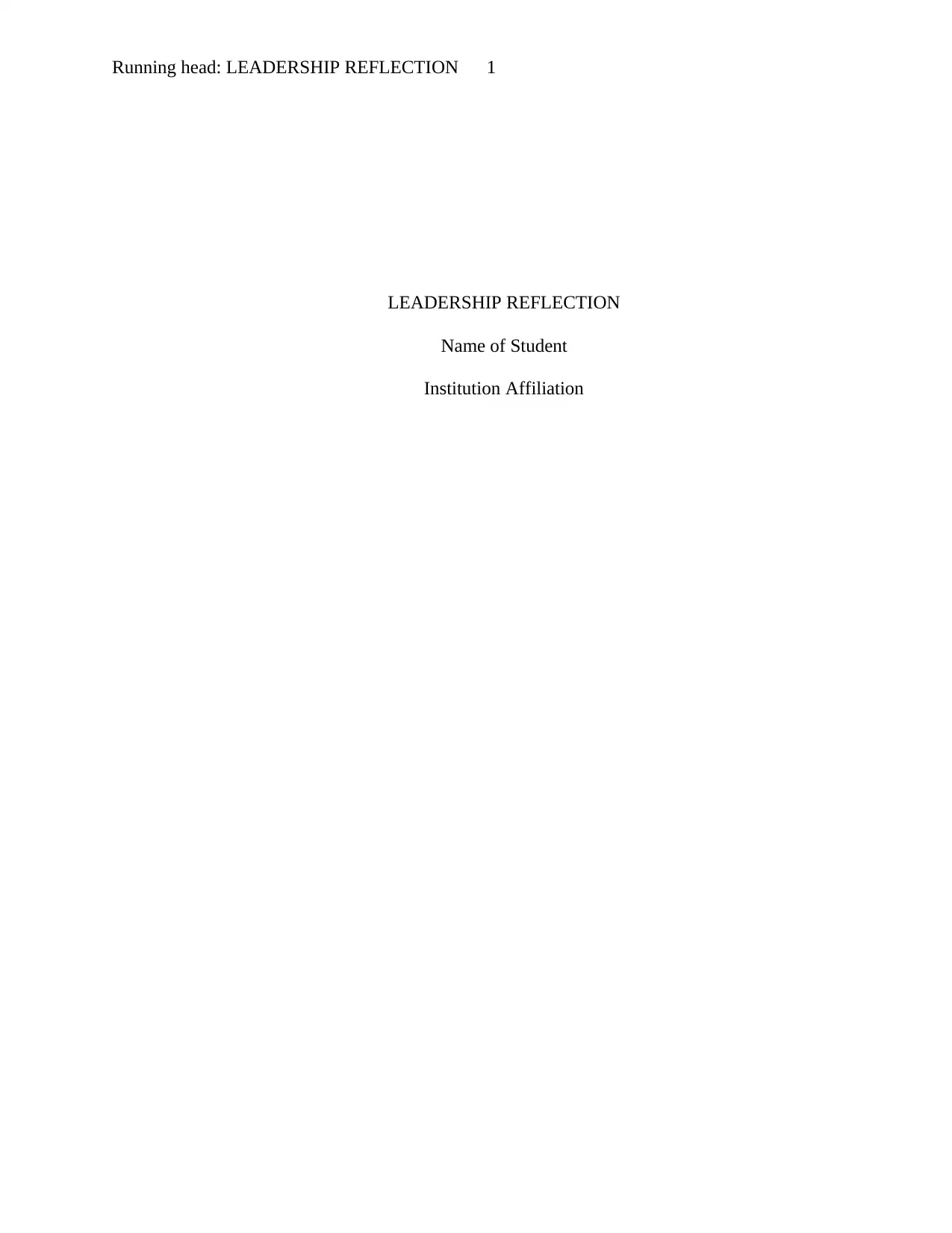
Running head: LEADERSHIP REFLECTION 1
LEADERSHIP REFLECTION
Name of Student
Institution Affiliation
LEADERSHIP REFLECTION
Name of Student
Institution Affiliation
Paraphrase This Document
Need a fresh take? Get an instant paraphrase of this document with our AI Paraphraser
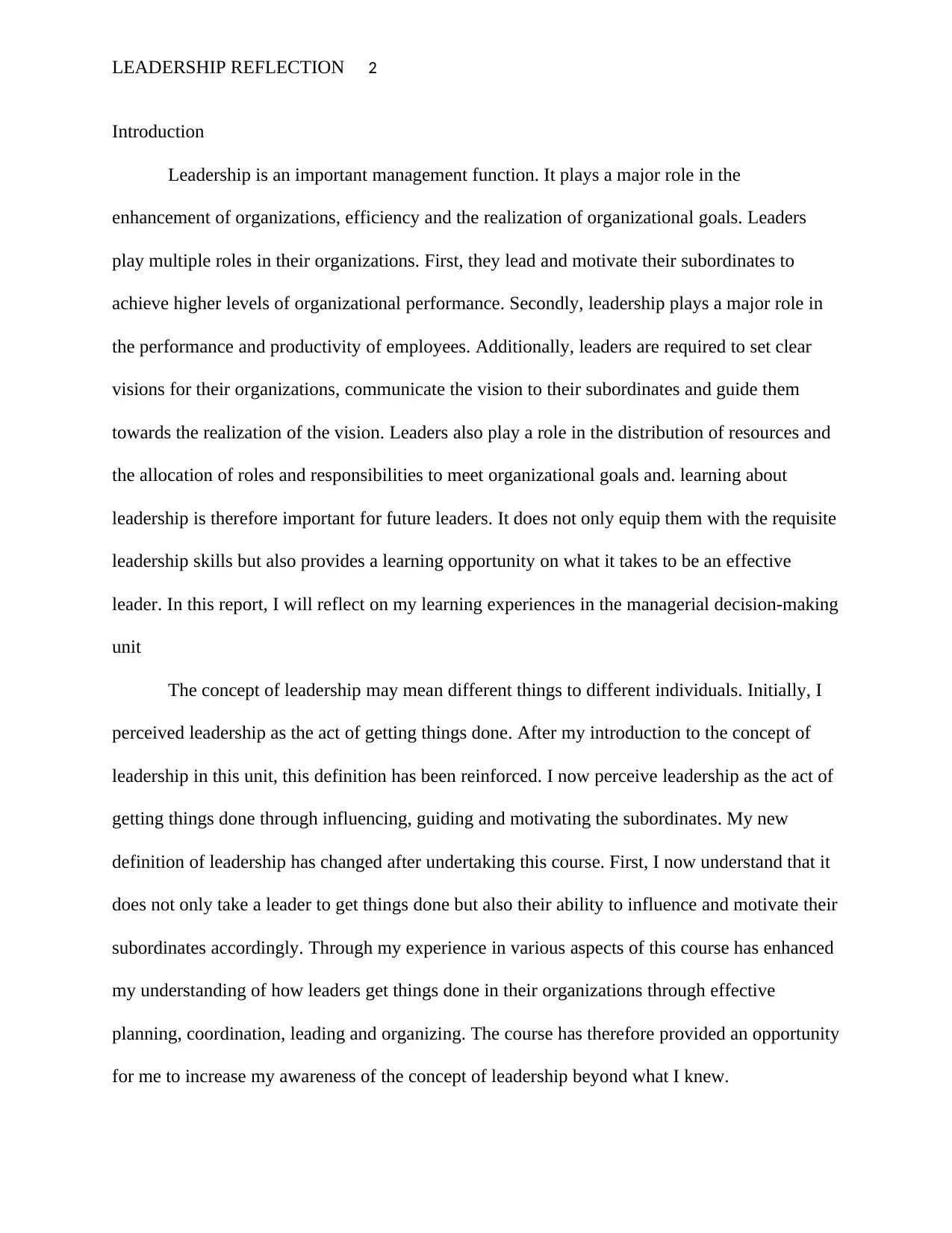
LEADERSHIP REFLECTION 2
Introduction
Leadership is an important management function. It plays a major role in the
enhancement of organizations, efficiency and the realization of organizational goals. Leaders
play multiple roles in their organizations. First, they lead and motivate their subordinates to
achieve higher levels of organizational performance. Secondly, leadership plays a major role in
the performance and productivity of employees. Additionally, leaders are required to set clear
visions for their organizations, communicate the vision to their subordinates and guide them
towards the realization of the vision. Leaders also play a role in the distribution of resources and
the allocation of roles and responsibilities to meet organizational goals and. learning about
leadership is therefore important for future leaders. It does not only equip them with the requisite
leadership skills but also provides a learning opportunity on what it takes to be an effective
leader. In this report, I will reflect on my learning experiences in the managerial decision-making
unit
The concept of leadership may mean different things to different individuals. Initially, I
perceived leadership as the act of getting things done. After my introduction to the concept of
leadership in this unit, this definition has been reinforced. I now perceive leadership as the act of
getting things done through influencing, guiding and motivating the subordinates. My new
definition of leadership has changed after undertaking this course. First, I now understand that it
does not only take a leader to get things done but also their ability to influence and motivate their
subordinates accordingly. Through my experience in various aspects of this course has enhanced
my understanding of how leaders get things done in their organizations through effective
planning, coordination, leading and organizing. The course has therefore provided an opportunity
for me to increase my awareness of the concept of leadership beyond what I knew.
Introduction
Leadership is an important management function. It plays a major role in the
enhancement of organizations, efficiency and the realization of organizational goals. Leaders
play multiple roles in their organizations. First, they lead and motivate their subordinates to
achieve higher levels of organizational performance. Secondly, leadership plays a major role in
the performance and productivity of employees. Additionally, leaders are required to set clear
visions for their organizations, communicate the vision to their subordinates and guide them
towards the realization of the vision. Leaders also play a role in the distribution of resources and
the allocation of roles and responsibilities to meet organizational goals and. learning about
leadership is therefore important for future leaders. It does not only equip them with the requisite
leadership skills but also provides a learning opportunity on what it takes to be an effective
leader. In this report, I will reflect on my learning experiences in the managerial decision-making
unit
The concept of leadership may mean different things to different individuals. Initially, I
perceived leadership as the act of getting things done. After my introduction to the concept of
leadership in this unit, this definition has been reinforced. I now perceive leadership as the act of
getting things done through influencing, guiding and motivating the subordinates. My new
definition of leadership has changed after undertaking this course. First, I now understand that it
does not only take a leader to get things done but also their ability to influence and motivate their
subordinates accordingly. Through my experience in various aspects of this course has enhanced
my understanding of how leaders get things done in their organizations through effective
planning, coordination, leading and organizing. The course has therefore provided an opportunity
for me to increase my awareness of the concept of leadership beyond what I knew.
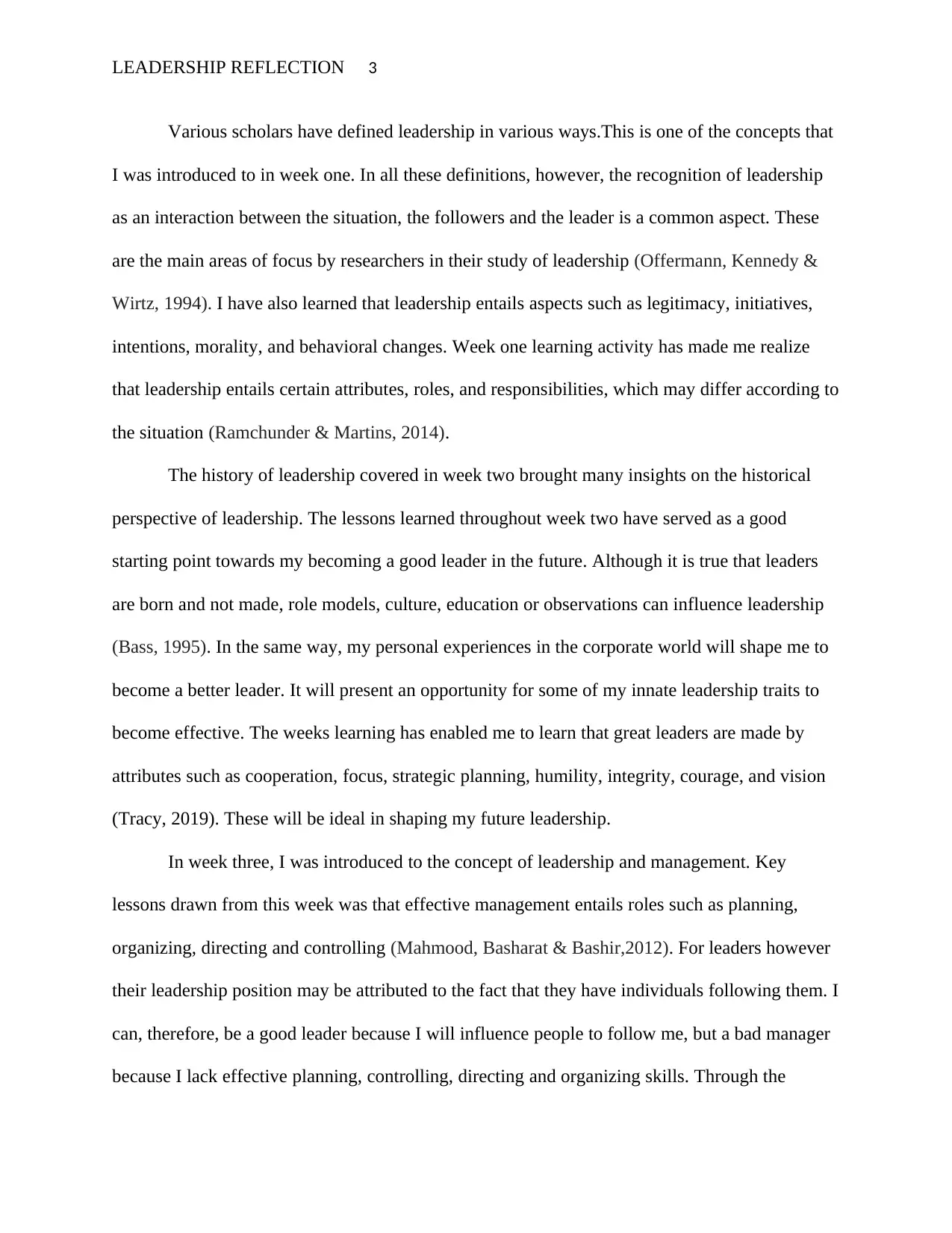
LEADERSHIP REFLECTION 3
Various scholars have defined leadership in various ways.This is one of the concepts that
I was introduced to in week one. In all these definitions, however, the recognition of leadership
as an interaction between the situation, the followers and the leader is a common aspect. These
are the main areas of focus by researchers in their study of leadership (Offermann, Kennedy &
Wirtz, 1994). I have also learned that leadership entails aspects such as legitimacy, initiatives,
intentions, morality, and behavioral changes. Week one learning activity has made me realize
that leadership entails certain attributes, roles, and responsibilities, which may differ according to
the situation (Ramchunder & Martins, 2014).
The history of leadership covered in week two brought many insights on the historical
perspective of leadership. The lessons learned throughout week two have served as a good
starting point towards my becoming a good leader in the future. Although it is true that leaders
are born and not made, role models, culture, education or observations can influence leadership
(Bass, 1995). In the same way, my personal experiences in the corporate world will shape me to
become a better leader. It will present an opportunity for some of my innate leadership traits to
become effective. The weeks learning has enabled me to learn that great leaders are made by
attributes such as cooperation, focus, strategic planning, humility, integrity, courage, and vision
(Tracy, 2019). These will be ideal in shaping my future leadership.
In week three, I was introduced to the concept of leadership and management. Key
lessons drawn from this week was that effective management entails roles such as planning,
organizing, directing and controlling (Mahmood, Basharat & Bashir,2012). For leaders however
their leadership position may be attributed to the fact that they have individuals following them. I
can, therefore, be a good leader because I will influence people to follow me, but a bad manager
because I lack effective planning, controlling, directing and organizing skills. Through the
Various scholars have defined leadership in various ways.This is one of the concepts that
I was introduced to in week one. In all these definitions, however, the recognition of leadership
as an interaction between the situation, the followers and the leader is a common aspect. These
are the main areas of focus by researchers in their study of leadership (Offermann, Kennedy &
Wirtz, 1994). I have also learned that leadership entails aspects such as legitimacy, initiatives,
intentions, morality, and behavioral changes. Week one learning activity has made me realize
that leadership entails certain attributes, roles, and responsibilities, which may differ according to
the situation (Ramchunder & Martins, 2014).
The history of leadership covered in week two brought many insights on the historical
perspective of leadership. The lessons learned throughout week two have served as a good
starting point towards my becoming a good leader in the future. Although it is true that leaders
are born and not made, role models, culture, education or observations can influence leadership
(Bass, 1995). In the same way, my personal experiences in the corporate world will shape me to
become a better leader. It will present an opportunity for some of my innate leadership traits to
become effective. The weeks learning has enabled me to learn that great leaders are made by
attributes such as cooperation, focus, strategic planning, humility, integrity, courage, and vision
(Tracy, 2019). These will be ideal in shaping my future leadership.
In week three, I was introduced to the concept of leadership and management. Key
lessons drawn from this week was that effective management entails roles such as planning,
organizing, directing and controlling (Mahmood, Basharat & Bashir,2012). For leaders however
their leadership position may be attributed to the fact that they have individuals following them. I
can, therefore, be a good leader because I will influence people to follow me, but a bad manager
because I lack effective planning, controlling, directing and organizing skills. Through the
⊘ This is a preview!⊘
Do you want full access?
Subscribe today to unlock all pages.

Trusted by 1+ million students worldwide
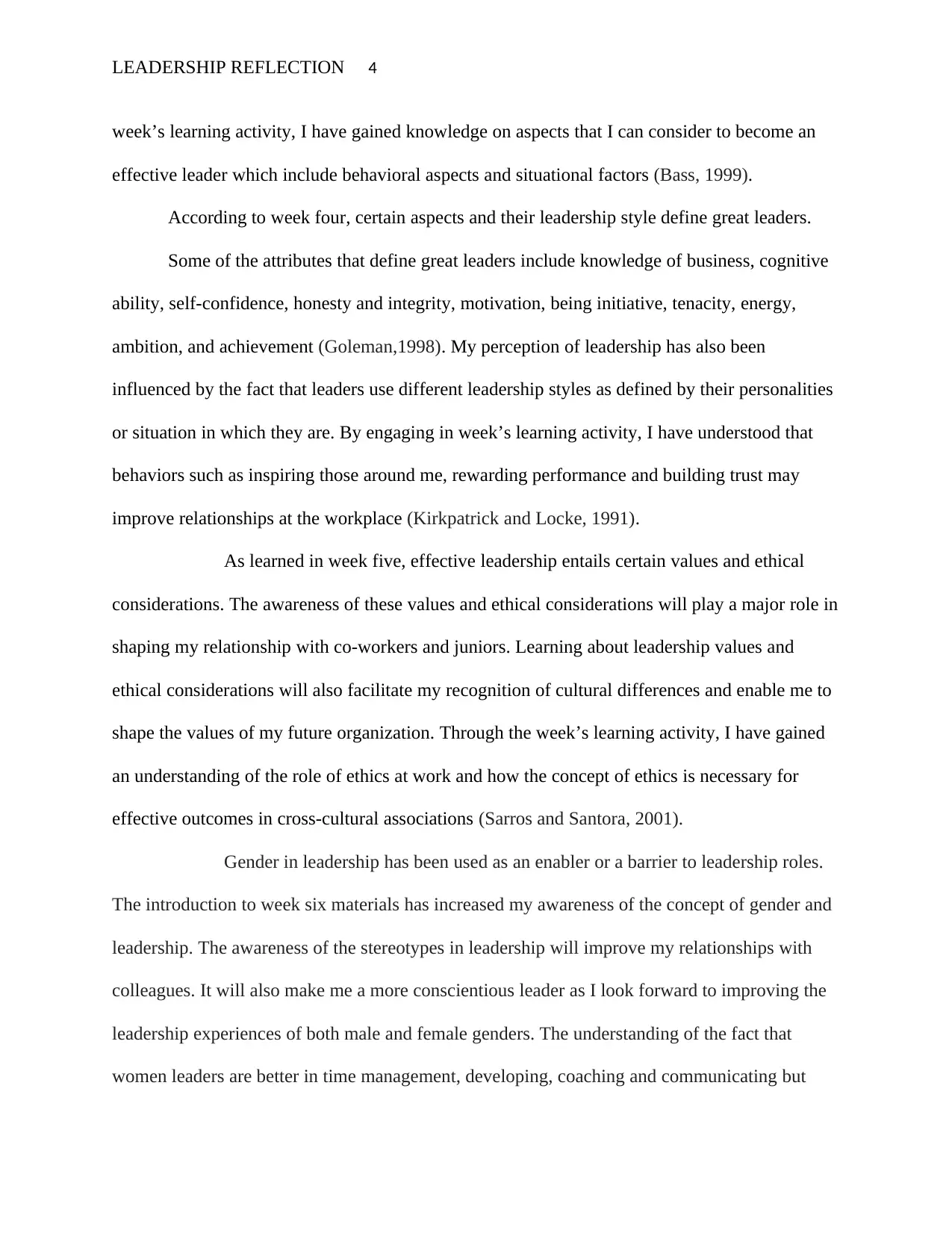
LEADERSHIP REFLECTION 4
week’s learning activity, I have gained knowledge on aspects that I can consider to become an
effective leader which include behavioral aspects and situational factors (Bass, 1999).
According to week four, certain aspects and their leadership style define great leaders.
Some of the attributes that define great leaders include knowledge of business, cognitive
ability, self-confidence, honesty and integrity, motivation, being initiative, tenacity, energy,
ambition, and achievement (Goleman,1998). My perception of leadership has also been
influenced by the fact that leaders use different leadership styles as defined by their personalities
or situation in which they are. By engaging in week’s learning activity, I have understood that
behaviors such as inspiring those around me, rewarding performance and building trust may
improve relationships at the workplace (Kirkpatrick and Locke, 1991).
As learned in week five, effective leadership entails certain values and ethical
considerations. The awareness of these values and ethical considerations will play a major role in
shaping my relationship with co-workers and juniors. Learning about leadership values and
ethical considerations will also facilitate my recognition of cultural differences and enable me to
shape the values of my future organization. Through the week’s learning activity, I have gained
an understanding of the role of ethics at work and how the concept of ethics is necessary for
effective outcomes in cross-cultural associations (Sarros and Santora, 2001).
Gender in leadership has been used as an enabler or a barrier to leadership roles.
The introduction to week six materials has increased my awareness of the concept of gender and
leadership. The awareness of the stereotypes in leadership will improve my relationships with
colleagues. It will also make me a more conscientious leader as I look forward to improving the
leadership experiences of both male and female genders. The understanding of the fact that
women leaders are better in time management, developing, coaching and communicating but
week’s learning activity, I have gained knowledge on aspects that I can consider to become an
effective leader which include behavioral aspects and situational factors (Bass, 1999).
According to week four, certain aspects and their leadership style define great leaders.
Some of the attributes that define great leaders include knowledge of business, cognitive
ability, self-confidence, honesty and integrity, motivation, being initiative, tenacity, energy,
ambition, and achievement (Goleman,1998). My perception of leadership has also been
influenced by the fact that leaders use different leadership styles as defined by their personalities
or situation in which they are. By engaging in week’s learning activity, I have understood that
behaviors such as inspiring those around me, rewarding performance and building trust may
improve relationships at the workplace (Kirkpatrick and Locke, 1991).
As learned in week five, effective leadership entails certain values and ethical
considerations. The awareness of these values and ethical considerations will play a major role in
shaping my relationship with co-workers and juniors. Learning about leadership values and
ethical considerations will also facilitate my recognition of cultural differences and enable me to
shape the values of my future organization. Through the week’s learning activity, I have gained
an understanding of the role of ethics at work and how the concept of ethics is necessary for
effective outcomes in cross-cultural associations (Sarros and Santora, 2001).
Gender in leadership has been used as an enabler or a barrier to leadership roles.
The introduction to week six materials has increased my awareness of the concept of gender and
leadership. The awareness of the stereotypes in leadership will improve my relationships with
colleagues. It will also make me a more conscientious leader as I look forward to improving the
leadership experiences of both male and female genders. The understanding of the fact that
women leaders are better in time management, developing, coaching and communicating but
Paraphrase This Document
Need a fresh take? Get an instant paraphrase of this document with our AI Paraphraser
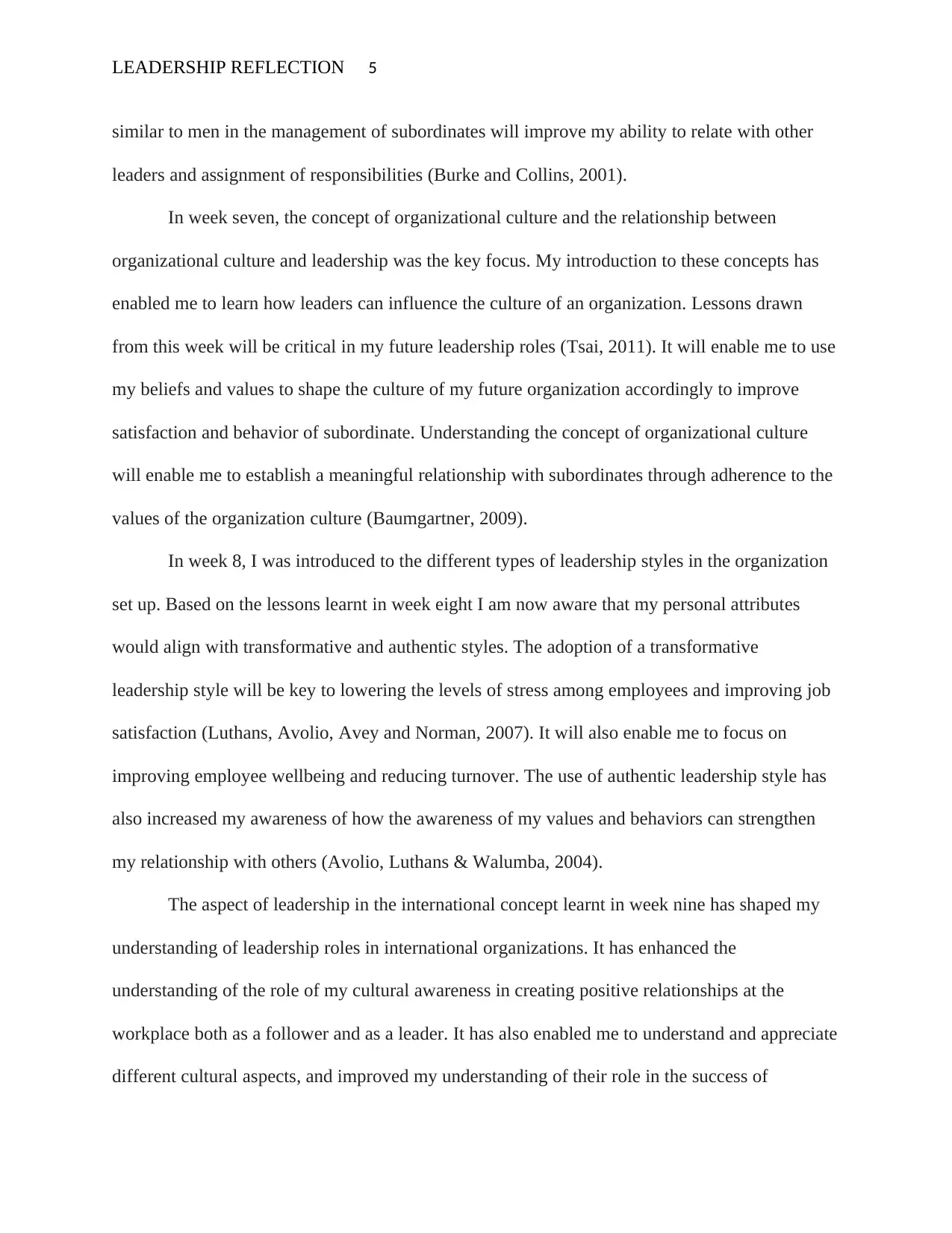
LEADERSHIP REFLECTION 5
similar to men in the management of subordinates will improve my ability to relate with other
leaders and assignment of responsibilities (Burke and Collins, 2001).
In week seven, the concept of organizational culture and the relationship between
organizational culture and leadership was the key focus. My introduction to these concepts has
enabled me to learn how leaders can influence the culture of an organization. Lessons drawn
from this week will be critical in my future leadership roles (Tsai, 2011). It will enable me to use
my beliefs and values to shape the culture of my future organization accordingly to improve
satisfaction and behavior of subordinate. Understanding the concept of organizational culture
will enable me to establish a meaningful relationship with subordinates through adherence to the
values of the organization culture (Baumgartner, 2009).
In week 8, I was introduced to the different types of leadership styles in the organization
set up. Based on the lessons learnt in week eight I am now aware that my personal attributes
would align with transformative and authentic styles. The adoption of a transformative
leadership style will be key to lowering the levels of stress among employees and improving job
satisfaction (Luthans, Avolio, Avey and Norman, 2007). It will also enable me to focus on
improving employee wellbeing and reducing turnover. The use of authentic leadership style has
also increased my awareness of how the awareness of my values and behaviors can strengthen
my relationship with others (Avolio, Luthans & Walumba, 2004).
The aspect of leadership in the international concept learnt in week nine has shaped my
understanding of leadership roles in international organizations. It has enhanced the
understanding of the role of my cultural awareness in creating positive relationships at the
workplace both as a follower and as a leader. It has also enabled me to understand and appreciate
different cultural aspects, and improved my understanding of their role in the success of
similar to men in the management of subordinates will improve my ability to relate with other
leaders and assignment of responsibilities (Burke and Collins, 2001).
In week seven, the concept of organizational culture and the relationship between
organizational culture and leadership was the key focus. My introduction to these concepts has
enabled me to learn how leaders can influence the culture of an organization. Lessons drawn
from this week will be critical in my future leadership roles (Tsai, 2011). It will enable me to use
my beliefs and values to shape the culture of my future organization accordingly to improve
satisfaction and behavior of subordinate. Understanding the concept of organizational culture
will enable me to establish a meaningful relationship with subordinates through adherence to the
values of the organization culture (Baumgartner, 2009).
In week 8, I was introduced to the different types of leadership styles in the organization
set up. Based on the lessons learnt in week eight I am now aware that my personal attributes
would align with transformative and authentic styles. The adoption of a transformative
leadership style will be key to lowering the levels of stress among employees and improving job
satisfaction (Luthans, Avolio, Avey and Norman, 2007). It will also enable me to focus on
improving employee wellbeing and reducing turnover. The use of authentic leadership style has
also increased my awareness of how the awareness of my values and behaviors can strengthen
my relationship with others (Avolio, Luthans & Walumba, 2004).
The aspect of leadership in the international concept learnt in week nine has shaped my
understanding of leadership roles in international organizations. It has enhanced the
understanding of the role of my cultural awareness in creating positive relationships at the
workplace both as a follower and as a leader. It has also enabled me to understand and appreciate
different cultural aspects, and improved my understanding of their role in the success of
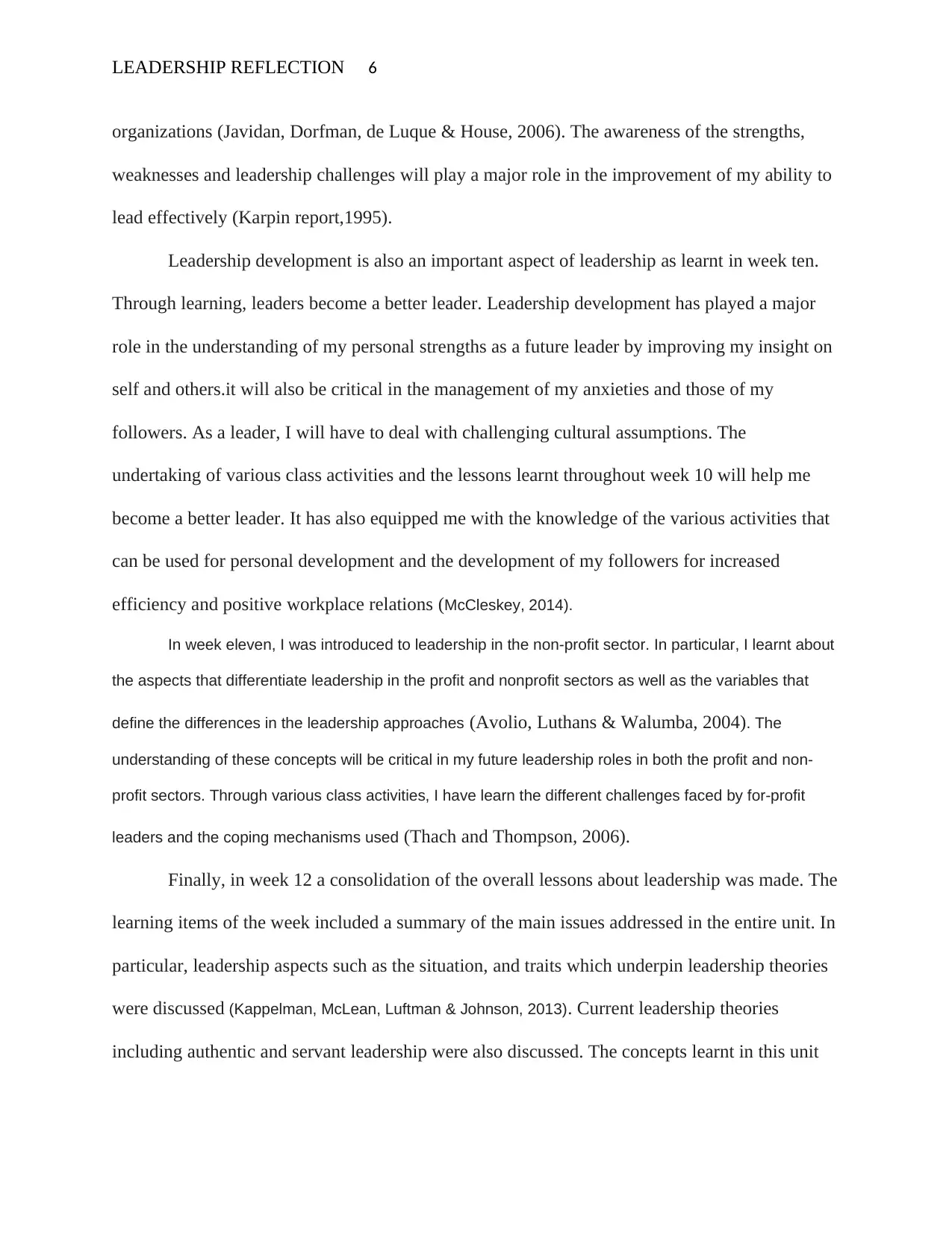
LEADERSHIP REFLECTION 6
organizations (Javidan, Dorfman, de Luque & House, 2006). The awareness of the strengths,
weaknesses and leadership challenges will play a major role in the improvement of my ability to
lead effectively (Karpin report,1995).
Leadership development is also an important aspect of leadership as learnt in week ten.
Through learning, leaders become a better leader. Leadership development has played a major
role in the understanding of my personal strengths as a future leader by improving my insight on
self and others.it will also be critical in the management of my anxieties and those of my
followers. As a leader, I will have to deal with challenging cultural assumptions. The
undertaking of various class activities and the lessons learnt throughout week 10 will help me
become a better leader. It has also equipped me with the knowledge of the various activities that
can be used for personal development and the development of my followers for increased
efficiency and positive workplace relations (McCleskey, 2014).
In week eleven, I was introduced to leadership in the non-profit sector. In particular, I learnt about
the aspects that differentiate leadership in the profit and nonprofit sectors as well as the variables that
define the differences in the leadership approaches (Avolio, Luthans & Walumba, 2004). The
understanding of these concepts will be critical in my future leadership roles in both the profit and non-
profit sectors. Through various class activities, I have learn the different challenges faced by for-profit
leaders and the coping mechanisms used (Thach and Thompson, 2006).
Finally, in week 12 a consolidation of the overall lessons about leadership was made. The
learning items of the week included a summary of the main issues addressed in the entire unit. In
particular, leadership aspects such as the situation, and traits which underpin leadership theories
were discussed (Kappelman, McLean, Luftman & Johnson, 2013). Current leadership theories
including authentic and servant leadership were also discussed. The concepts learnt in this unit
organizations (Javidan, Dorfman, de Luque & House, 2006). The awareness of the strengths,
weaknesses and leadership challenges will play a major role in the improvement of my ability to
lead effectively (Karpin report,1995).
Leadership development is also an important aspect of leadership as learnt in week ten.
Through learning, leaders become a better leader. Leadership development has played a major
role in the understanding of my personal strengths as a future leader by improving my insight on
self and others.it will also be critical in the management of my anxieties and those of my
followers. As a leader, I will have to deal with challenging cultural assumptions. The
undertaking of various class activities and the lessons learnt throughout week 10 will help me
become a better leader. It has also equipped me with the knowledge of the various activities that
can be used for personal development and the development of my followers for increased
efficiency and positive workplace relations (McCleskey, 2014).
In week eleven, I was introduced to leadership in the non-profit sector. In particular, I learnt about
the aspects that differentiate leadership in the profit and nonprofit sectors as well as the variables that
define the differences in the leadership approaches (Avolio, Luthans & Walumba, 2004). The
understanding of these concepts will be critical in my future leadership roles in both the profit and non-
profit sectors. Through various class activities, I have learn the different challenges faced by for-profit
leaders and the coping mechanisms used (Thach and Thompson, 2006).
Finally, in week 12 a consolidation of the overall lessons about leadership was made. The
learning items of the week included a summary of the main issues addressed in the entire unit. In
particular, leadership aspects such as the situation, and traits which underpin leadership theories
were discussed (Kappelman, McLean, Luftman & Johnson, 2013). Current leadership theories
including authentic and servant leadership were also discussed. The concepts learnt in this unit
⊘ This is a preview!⊘
Do you want full access?
Subscribe today to unlock all pages.

Trusted by 1+ million students worldwide
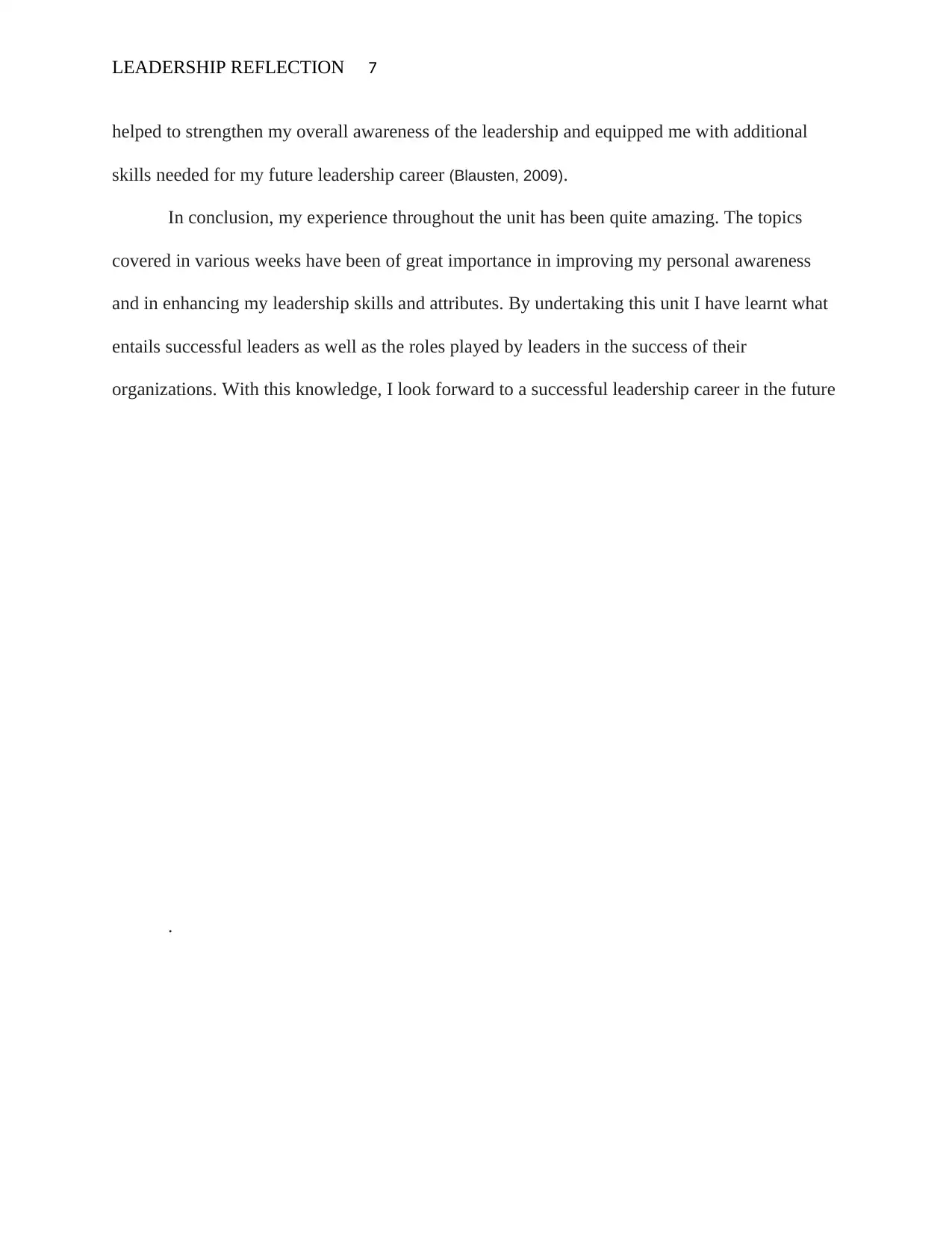
LEADERSHIP REFLECTION 7
helped to strengthen my overall awareness of the leadership and equipped me with additional
skills needed for my future leadership career (Blausten, 2009).
In conclusion, my experience throughout the unit has been quite amazing. The topics
covered in various weeks have been of great importance in improving my personal awareness
and in enhancing my leadership skills and attributes. By undertaking this unit I have learnt what
entails successful leaders as well as the roles played by leaders in the success of their
organizations. With this knowledge, I look forward to a successful leadership career in the future
.
helped to strengthen my overall awareness of the leadership and equipped me with additional
skills needed for my future leadership career (Blausten, 2009).
In conclusion, my experience throughout the unit has been quite amazing. The topics
covered in various weeks have been of great importance in improving my personal awareness
and in enhancing my leadership skills and attributes. By undertaking this unit I have learnt what
entails successful leaders as well as the roles played by leaders in the success of their
organizations. With this knowledge, I look forward to a successful leadership career in the future
.
Paraphrase This Document
Need a fresh take? Get an instant paraphrase of this document with our AI Paraphraser
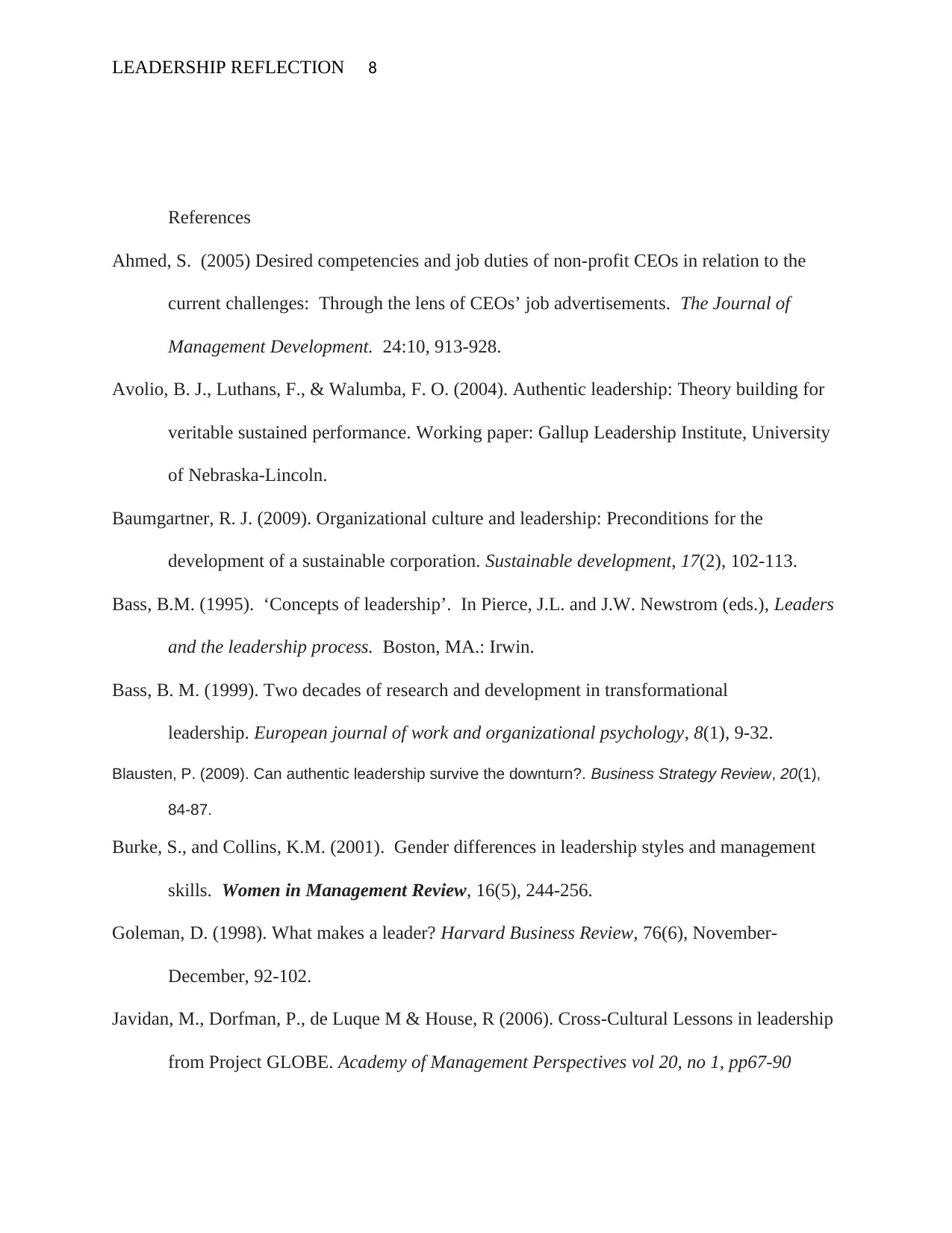
LEADERSHIP REFLECTION 8
References
Ahmed, S. (2005) Desired competencies and job duties of non-profit CEOs in relation to the
current challenges: Through the lens of CEOs’ job advertisements. The Journal of
Management Development. 24:10, 913-928.
Avolio, B. J., Luthans, F., & Walumba, F. O. (2004). Authentic leadership: Theory building for
veritable sustained performance. Working paper: Gallup Leadership Institute, University
of Nebraska-Lincoln.
Baumgartner, R. J. (2009). Organizational culture and leadership: Preconditions for the
development of a sustainable corporation. Sustainable development, 17(2), 102-113.
Bass, B.M. (1995). ‘Concepts of leadership’. In Pierce, J.L. and J.W. Newstrom (eds.), Leaders
and the leadership process. Boston, MA.: Irwin.
Bass, B. M. (1999). Two decades of research and development in transformational
leadership. European journal of work and organizational psychology, 8(1), 9-32.
Blausten, P. (2009). Can authentic leadership survive the downturn?. Business Strategy Review, 20(1),
84-87.
Burke, S., and Collins, K.M. (2001). Gender differences in leadership styles and management
skills. Women in Management Review, 16(5), 244-256.
Goleman, D. (1998). What makes a leader? Harvard Business Review, 76(6), November-
December, 92-102.
Javidan, M., Dorfman, P., de Luque M & House, R (2006). Cross-Cultural Lessons in leadership
from Project GLOBE. Academy of Management Perspectives vol 20, no 1, pp67-90
References
Ahmed, S. (2005) Desired competencies and job duties of non-profit CEOs in relation to the
current challenges: Through the lens of CEOs’ job advertisements. The Journal of
Management Development. 24:10, 913-928.
Avolio, B. J., Luthans, F., & Walumba, F. O. (2004). Authentic leadership: Theory building for
veritable sustained performance. Working paper: Gallup Leadership Institute, University
of Nebraska-Lincoln.
Baumgartner, R. J. (2009). Organizational culture and leadership: Preconditions for the
development of a sustainable corporation. Sustainable development, 17(2), 102-113.
Bass, B.M. (1995). ‘Concepts of leadership’. In Pierce, J.L. and J.W. Newstrom (eds.), Leaders
and the leadership process. Boston, MA.: Irwin.
Bass, B. M. (1999). Two decades of research and development in transformational
leadership. European journal of work and organizational psychology, 8(1), 9-32.
Blausten, P. (2009). Can authentic leadership survive the downturn?. Business Strategy Review, 20(1),
84-87.
Burke, S., and Collins, K.M. (2001). Gender differences in leadership styles and management
skills. Women in Management Review, 16(5), 244-256.
Goleman, D. (1998). What makes a leader? Harvard Business Review, 76(6), November-
December, 92-102.
Javidan, M., Dorfman, P., de Luque M & House, R (2006). Cross-Cultural Lessons in leadership
from Project GLOBE. Academy of Management Perspectives vol 20, no 1, pp67-90
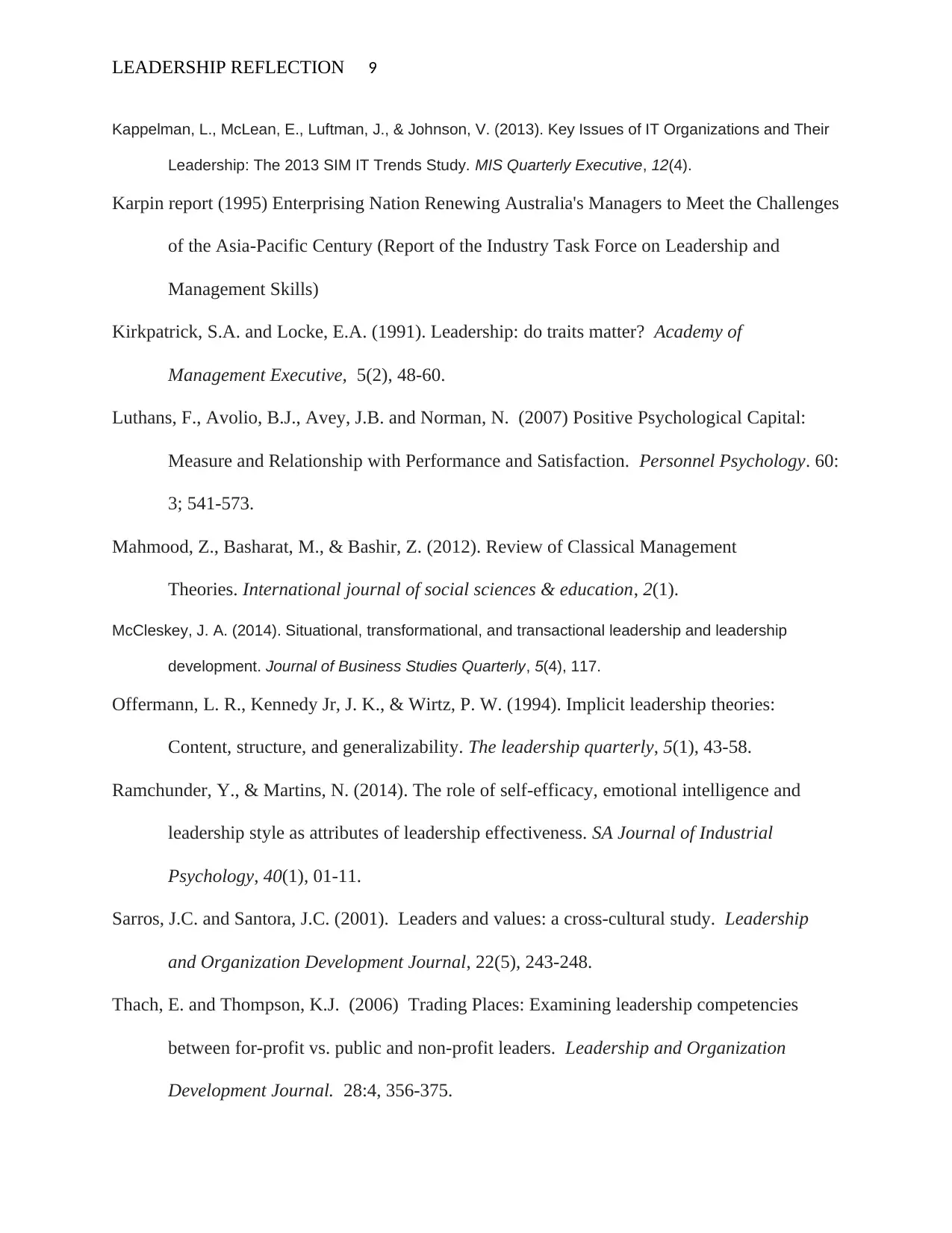
LEADERSHIP REFLECTION 9
Kappelman, L., McLean, E., Luftman, J., & Johnson, V. (2013). Key Issues of IT Organizations and Their
Leadership: The 2013 SIM IT Trends Study. MIS Quarterly Executive, 12(4).
Karpin report (1995) Enterprising Nation Renewing Australia's Managers to Meet the Challenges
of the Asia-Pacific Century (Report of the Industry Task Force on Leadership and
Management Skills)
Kirkpatrick, S.A. and Locke, E.A. (1991). Leadership: do traits matter? Academy of
Management Executive, 5(2), 48-60.
Luthans, F., Avolio, B.J., Avey, J.B. and Norman, N. (2007) Positive Psychological Capital:
Measure and Relationship with Performance and Satisfaction. Personnel Psychology. 60:
3; 541-573.
Mahmood, Z., Basharat, M., & Bashir, Z. (2012). Review of Classical Management
Theories. International journal of social sciences & education, 2(1).
McCleskey, J. A. (2014). Situational, transformational, and transactional leadership and leadership
development. Journal of Business Studies Quarterly, 5(4), 117.
Offermann, L. R., Kennedy Jr, J. K., & Wirtz, P. W. (1994). Implicit leadership theories:
Content, structure, and generalizability. The leadership quarterly, 5(1), 43-58.
Ramchunder, Y., & Martins, N. (2014). The role of self-efficacy, emotional intelligence and
leadership style as attributes of leadership effectiveness. SA Journal of Industrial
Psychology, 40(1), 01-11.
Sarros, J.C. and Santora, J.C. (2001). Leaders and values: a cross-cultural study. Leadership
and Organization Development Journal, 22(5), 243-248.
Thach, E. and Thompson, K.J. (2006) Trading Places: Examining leadership competencies
between for-profit vs. public and non-profit leaders. Leadership and Organization
Development Journal. 28:4, 356-375.
Kappelman, L., McLean, E., Luftman, J., & Johnson, V. (2013). Key Issues of IT Organizations and Their
Leadership: The 2013 SIM IT Trends Study. MIS Quarterly Executive, 12(4).
Karpin report (1995) Enterprising Nation Renewing Australia's Managers to Meet the Challenges
of the Asia-Pacific Century (Report of the Industry Task Force on Leadership and
Management Skills)
Kirkpatrick, S.A. and Locke, E.A. (1991). Leadership: do traits matter? Academy of
Management Executive, 5(2), 48-60.
Luthans, F., Avolio, B.J., Avey, J.B. and Norman, N. (2007) Positive Psychological Capital:
Measure and Relationship with Performance and Satisfaction. Personnel Psychology. 60:
3; 541-573.
Mahmood, Z., Basharat, M., & Bashir, Z. (2012). Review of Classical Management
Theories. International journal of social sciences & education, 2(1).
McCleskey, J. A. (2014). Situational, transformational, and transactional leadership and leadership
development. Journal of Business Studies Quarterly, 5(4), 117.
Offermann, L. R., Kennedy Jr, J. K., & Wirtz, P. W. (1994). Implicit leadership theories:
Content, structure, and generalizability. The leadership quarterly, 5(1), 43-58.
Ramchunder, Y., & Martins, N. (2014). The role of self-efficacy, emotional intelligence and
leadership style as attributes of leadership effectiveness. SA Journal of Industrial
Psychology, 40(1), 01-11.
Sarros, J.C. and Santora, J.C. (2001). Leaders and values: a cross-cultural study. Leadership
and Organization Development Journal, 22(5), 243-248.
Thach, E. and Thompson, K.J. (2006) Trading Places: Examining leadership competencies
between for-profit vs. public and non-profit leaders. Leadership and Organization
Development Journal. 28:4, 356-375.
⊘ This is a preview!⊘
Do you want full access?
Subscribe today to unlock all pages.

Trusted by 1+ million students worldwide
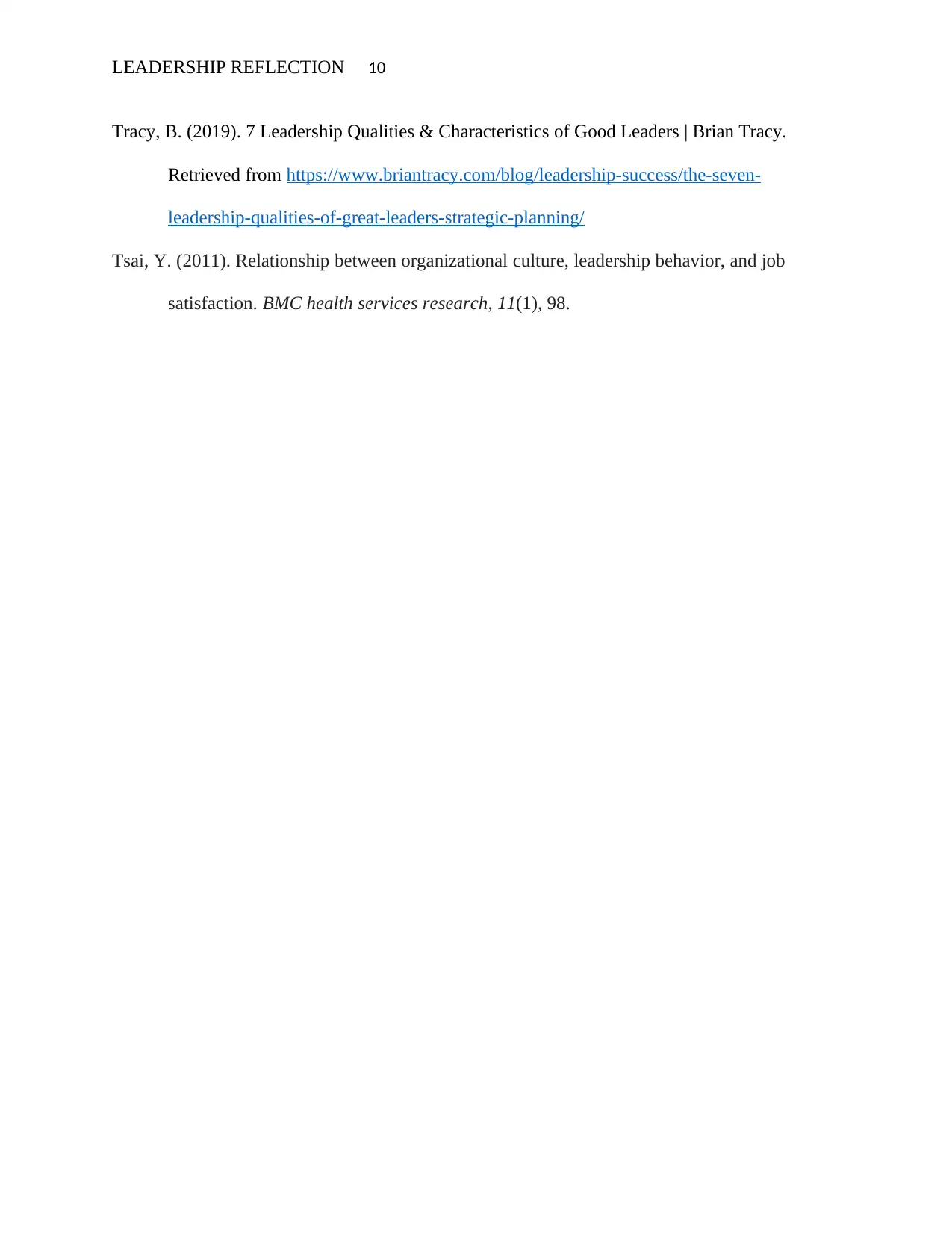
LEADERSHIP REFLECTION 10
Tracy, B. (2019). 7 Leadership Qualities & Characteristics of Good Leaders | Brian Tracy.
Retrieved from https://www.briantracy.com/blog/leadership-success/the-seven-
leadership-qualities-of-great-leaders-strategic-planning/
Tsai, Y. (2011). Relationship between organizational culture, leadership behavior, and job
satisfaction. BMC health services research, 11(1), 98.
Tracy, B. (2019). 7 Leadership Qualities & Characteristics of Good Leaders | Brian Tracy.
Retrieved from https://www.briantracy.com/blog/leadership-success/the-seven-
leadership-qualities-of-great-leaders-strategic-planning/
Tsai, Y. (2011). Relationship between organizational culture, leadership behavior, and job
satisfaction. BMC health services research, 11(1), 98.
1 out of 10
Related Documents
Your All-in-One AI-Powered Toolkit for Academic Success.
+13062052269
info@desklib.com
Available 24*7 on WhatsApp / Email
![[object Object]](/_next/static/media/star-bottom.7253800d.svg)
Unlock your academic potential
Copyright © 2020–2025 A2Z Services. All Rights Reserved. Developed and managed by ZUCOL.





